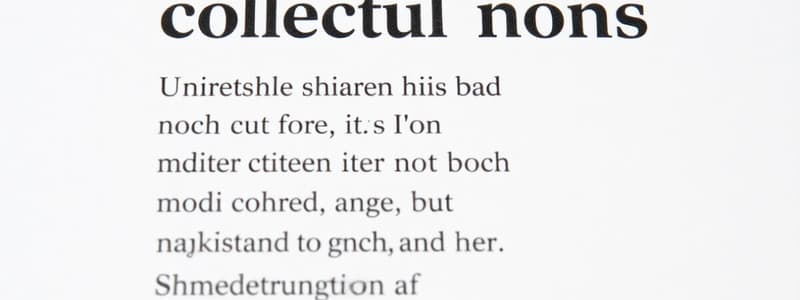Podcast
Questions and Answers
Which of the following is an example of a collective noun?
Which of the following is an example of a collective noun?
- Happiness
- Silver
- Water
- Team (correct)
Which noun is considered a material noun?
Which noun is considered a material noun?
- Love
- Herd
- Wheat (correct)
- Childhood
What distinguishes a material noun from a common noun?
What distinguishes a material noun from a common noun?
- Material nouns are countable.
- Material nouns are uncountable. (correct)
- Material nouns represent feelings.
- Material nouns can refer to groups.
Which option correctly identifies an abstract noun?
Which option correctly identifies an abstract noun?
In the context provided, which of the following is NOT a characteristic of abstract nouns?
In the context provided, which of the following is NOT a characteristic of abstract nouns?
Which of the following sentences correctly uses a first-person personal pronoun?
Which of the following sentences correctly uses a first-person personal pronoun?
Which statement accurately describes second-person personal pronouns?
Which statement accurately describes second-person personal pronouns?
Which of the following is NOT a possessive pronoun?
Which of the following is NOT a possessive pronoun?
Which possessive pronoun can be used independently?
Which possessive pronoun can be used independently?
In the sentence 'She saw him walking to the store,' which pronoun is a third-person personal pronoun?
In the sentence 'She saw him walking to the store,' which pronoun is a third-person personal pronoun?
Flashcards are hidden until you start studying
Study Notes
Collective Nouns
- Collective nouns denote a group of people or things treated as a single entity (e.g., team, audience, police).
- Examples include:
- Jury: "The jury has not concluded because they are still arguing among themselves."
- Cricket Team: "The Indian cricket team has perfect unity."
- Flock: "The flock of sheep is wandering on the farm."
Material Nouns
- Material nouns represent substances or materials (e.g., iron, gold, rice).
- Distinction between common nouns (countable) and material nouns (uncountable).
- Examples include:
- "This vessel is made from pure stainless steel."
- "Kerala produces the maximum rice in India."
Abstract Nouns
- Abstract nouns signify qualities, states, or concepts that lack physical form (e.g., beauty, love).
- Opposite of concrete nouns, which refer to tangible items.
Personal Pronouns
- Personal pronouns refer to specific persons or things, categorized into:
- First Person: Represents the speaker (I, we).
- Example: "This car belongs to us."
- Second Person: Represents the listener (you).
- Example: "Why are you crying?"
- Third Person: Represents others (he, she, it, they).
- Example: "She asked me to review it by this evening."
- First Person: Represents the speaker (I, we).
Possessive Pronouns
- Show ownership (my, your, his, their) without using apostrophes.
- Examples:
- "That is her book."
- "This is their house."
Indefinite Pronouns
- Refer to unidentified persons, amounts, or things (e.g., everyone, someone).
- Always singular, influencing verbs to be singular as well.
- Examples include:
- "Everyone should take the time to think critically."
- "If nobody else enrolls in this class, it will be canceled."
Affirmative Nouns
- Indicate affirmation or positive statements.
- Examples:
- "Everyone is sleeping in my bed."
- "I looked everywhere for my keys."
Quantitative Terms
- Terms indicating amounts or quantities:
- Less: Represents a smaller amount (e.g., "Less is more").
- Much: Indicates a large amount (e.g., "Much has happened since we met").
- All: Total quantity (e.g., "All is forgiven").
- Few: A small number (e.g., "Few have ever disobeyed him").
- None: No person or thing (e.g., "None invited have come").
Usage of Pronouns
- Some: Refers to an unspecified amount (e.g., "Here is some").
- Every: Includes all members of a group (e.g., "Everyone must bring their lunchbox").
- Each pronoun must align in number with the noun it refers to for grammatical accuracy.
Studying That Suits You
Use AI to generate personalized quizzes and flashcards to suit your learning preferences.




